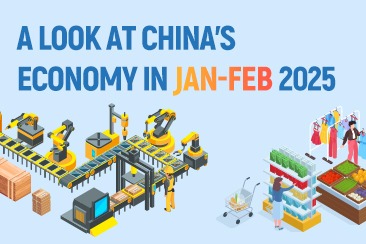New engines set to drive innovation
Nation's support for cutting-edge tech to help develop advanced productive forces


China's latest commitment to advancing cutting-edge technologies — including quantum computing, artificial intelligence and 6G — will solidify its position as a global leader in innovation, and the strategic push will enable the country to navigate global uncertainties while sustaining its competitive advantage, experts and business executives said.
Underscoring the importance of securing technological breakthroughs and efficiently commercializing them, they said that China's push for new quality productive forces will create vast opportunities for domestic and international businesses.
Their comments follow President Xi Jinping's remark that technological innovation and industrial innovation constitute the fundamental pathways for developing new quality productive forces.
Xi made the remark when participating in a deliberation in Beijing on March 5 with his fellow deputies from Jiangsu province during the third session of the 14th National People's Congress, China's top legislature.
China's 2025 Government Work Report also said the nation "will establish a mechanism to increase funding for industries of the future and foster industries such as biomanufacturing, quantum technology, embodied AI and 6G technology".
Wang Yiming, vice-chairman of the China Center for International Economic Exchanges, said, "China's economy has entered a critical period of transitioning between old and new growth drivers."
He said future-oriented technologies are not only at the forefront of innovation, but are also strategic pillars for reshaping industrial competition and boosting productivity.
"Their significance lies in both upgrading traditional industries and securing a leading position in emerging sectors," Wang said.
Guo Guoping, deputy director of the Key Lab of Quantum Information at the Chinese Academy of Sciences, said he was deeply impressed by China's support for quantum technology.
He compared quantum technology to an aircraft, with quantum computing serving as its "engine", providing exponential computational power for fields such as national defense, biomedicine, energy materials and AI.
"Quantum computing is transitioning from the lab to industrialization. China has become the third country in the world capable of delivering quantum computers, after Canada and the United States, positioning China in the global first tier of quantum research. But challenges remain in some areas," Guo said.
He stressed the need for increased investment in basic research and advocated leveraging China's unique advantages in mobilizing resources to tackle core technological challenges.
China's research and development spending climbed to 3.6 trillion yuan ($497 billion) in 2024, an 8 percent year-on-year increase, according to the National Bureau of Statistics. Of this total, funding allocated to basic research accounted for 6.91 percent of the R&D budget, underscoring heightened investment in foundational scientific exploration.
Meanwhile, more than 570 Chinese industrial companies have made it to the global top 2,500 companies in terms of R&D investment, according to the Ministry of Industry and Information Technology.
Xu Lijin, a member of the National Committee of the Chinese People's Political Consultative Conference, the nation's top political advisory body, and chairman of Wuhu Robot Industry Development Group, said that embodied AI, as highlighted in the Government Work Report, refers to AI that is integrated into physical hardware such as robots. It represents a significant leap in intelligent systems capable of interacting with and adapting to their environments.
"Robotics and AI are dual engines driving economic and social development in the era of global digital transformation," Xu said.
Qiao Hong, an academician of the Chinese Academy of Sciences, said, "Over the past three years, China has accounted for more than half of the global installation of industrial robots, and its lunar exploration robots have successfully returned lunar soil samples."
However, challenges remain. For instance, high-end sensors like precision lidar, short for light detection and ranging, still rely on imports, and domestic alternatives lag in accuracy and stability, experts added.
Zhang Li, president of the China Center for Information Industry Development, said: "Leveraging its robust and comprehensive industrial ecosystem, China creates expansive real-world testing grounds and vast market opportunities for technological innovation. This infrastructure not only accelerates the development of emerging industries, but also provides a resilient foundation for nurturing future-oriented sectors poised to redefine global markets."
As the world's largest manufacturing country, China ranks first globally in terms of output for more than 40 percent of the world's 500 major industrial products, data from the Ministry of Industry and Information Technology showed.
Industrial innovation must remain rooted in the real economy, Zhang said, noting that China's economy "has historically relied on the real economy, and it is through this foundation that it will continue to progress".
Ding Haiyu, deputy head of the China Mobile Research Institute, said that 6G "has entered its tech standardization phase this year, as we aim to commercialize the technology around 2030. AI-powered 6G will unlock significant opportunities".
Zheng Yongnian, dean of the School of Public Policy at the Chinese University of Hong Kong (Shenzhen), said, "To cultivate new quality productive forces, a country should prioritize three foundational pillars — advancing fundamental scientific research, bridging the gap between theoretical discoveries and applied technological solutions, and fostering a financial ecosystem capable of sustaining innovation-driven growth."
"Expanding institutional opening-up is the strategic guarantee for nurturing new quality productive forces," Zheng said.
David Poon, president of Infineon Technologies Greater China, said China's focus on green, low-carbon and high-quality development aligns with the German chip maker's strengths and opens new growth opportunities.
"With our 'In China, For China' strategy, we plan to increase local production of general-purpose semiconductors to address customer needs regarding supply resilience," Poon said.




































